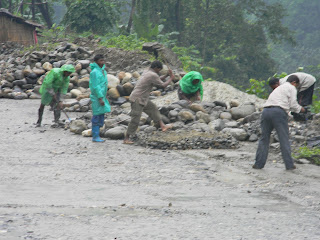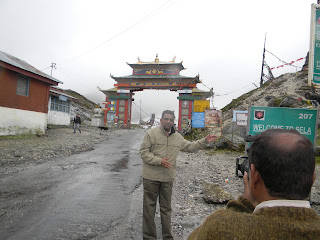After reading fine print of govt's announcement on Monday that it has settled the One Rank One pension issue, it is clear that none of the 4 core issues raised by the Service chiefs has been accepted. Resentment among serving personnel highlighted by Defence Minister AK Antony in his letter to PM continues. Status and parity not restored.
Although the govt has announced a 2300-cr package for pensioners, fine print shows that a jawan will get on an average just a Rs 400 increase.
Also out of the 4 issues granted by the Govt, 3 are applicable to ALL Central govt employees--so no special attention given to ex-servicemen, as has been claimed.
In August the three service chiefs had asked for the following issues to be resolved as far as serving personnel are concerned.
- Fixing common pay scales for all JCOs and ORs
- Grant of NFU (non-functional upgardation) status to commissioned officers
- Correcting difference in rank pay of commissioned officers
- Extending the HAG+ (Higher administrative Grade Plus) scale to all 3 star officers
- Granting One Rank One Pension to retired personnel
They had pointed out during the discussion on 7th August that a lot of critical infrastructure development work is being affected in various commands because of functional problems brought about by disparities between officers in uniform and their civilian counterparts.
The Army Chief pointed out that recently, two Army Commanders have written to him specifically on this particular issue, conveying great concern at the adverse affect the unresolved pay issue was having under their charge.
Defence Minister AK Antony, it will be recalled, had told the Prime Minister, about the restlessness among the armed forces and had warned about the possibility of "things turning bad."
The Army Chief pointed out that recently, two Army Commanders have written to him specifically on this particular issue, conveying great concern at the adverse affect the unresolved pay issue was having under their charge.
Defence Minister AK Antony, it will be recalled, had told the Prime Minister, about the restlessness among the armed forces and had warned about the possibility of "things turning bad."
Clearly, the government is not interested in resolving these issues since it knows the armed forces leadership will continue to swallow the insult and the neglect.
For the record, this is what the Government decided on September 24:
Rs.2300 crore approved to meet the demands of Ex-servicemen pensioners
The Union Cabinet has approved the recommendations of the Committee headed by Cabinet Secretary for benefits to ex-servicemen on four issues. The financial implications of the improvements made as per the Cabinet decision on the four items are broadly estimated at Rs.2300 crore per annum. The details are as follows:
I. One Rank One Pension:
On One Rank One Pension, the demand of the Defence Forces and Ex-Servicemen Associations is that uniform pension be paid to the Defence Forces personnel retiring in the same rank with the same length of service irrespective of their date of retirement and any future enhancement in the rates of pension be automatically passed on to the past pensioners.
The difference in the pension of present and past pensioners in the same rank occurs on account of the number of increments earned by the defence personnel in that rank. There is also a difference between the pension of pre 1.1.06 and post 1.1.06 retirees belonging to a particular rank. The UPA Government on two previous occasions has taken decisions to narrow the gap between the present and past pensioners, particularly those belonging to the ranks of JCOs and Other Ranks.
On the issue of One Rank One Pension, the following have been approved by the Cabinet:
(i) Bridging of the gap in the pension of pre 1.1.06 and post 1.1.06 JCO/OR retirees by determining the pension of pre 1.1.06 retirees on the basis of notional maximum for ranks and groups across the three Services as in the case of post 1.1.06 retirees. In addition, the weightage of qualifying service in the ranks of Sepoys, Naik and Havaldar would be increased by two years for both pre and post 1.1.06 retirees.
(ii) The pension of pre 1.1.06 Commissioned Officer pensioners would be stepped up with reference to the minimum of fitment table for the ranks instead of the minimum of pay band.
These are expected to largely meet the demands of the defence pensioners on one rank one pension.
II. Enhancement of Family Pension :
(i) The pension of pre - 1.1.2006 family pensioners(Commissioned Officers, Honorary Commissioned Officers, JCOs/ORs ) be stepped up based on the minimum of the fitment table instead of the minimum of the Pay Band;
(i) Establishing linkage of the family pension with the pension of JCOs/ORs, in those cases where the death takes place after the retirement of the JCO/OR since such a JCO/OR drew a pension based on the maximum of the pay scales, 60% of the pension applicable to JCO/OR pensioners would be granted to the family pensioner in case of normal family pension calculated a 30% of last pay drawn. Accordingly, based on the rank, group and length of service of the deceased JCO/OR pensioner, his pension would first be determined on notional basis. In cases where death of JCO/OR took place after retirement, the family pensioners in receipt of normal family pension would become entitled to 60% of the said pension determined on notional basis and those in receipt of enhanced family pension will be entitled to 100% of this pension. Similar entitlements would be determined in the case of Special Family Pension; and
(ii) The family pensioner of the JCO/OR would be granted pension arrived at on the basis of the family pension worked out as per the formulation at (i) above or the pension on the basis of stepping up with reference to the minimum of the fitment table, whichever is beneficial. Further, the linkage of family pension with retiring pension be applied in the case of post 1.1.2006 family pensioners of JCOs/ORs also.
III. Dual Family Pension:
Dual family pension would be allowed in the present and future cases where the pensioner drew, is drawing or may draw pension for military service as well as for civil employment.
IV. Family pension to mentally / physically challenged children of armed forces personnel on marriage:
Grant of family pension to mentally/physically challenged children who drew, are drawing or may draw family pension would continue even after their marriage.
The above recommendations made by the Committee on pension issues of Ex-Servicemen may be implemented from a prospective date and payment made accordingly.
The Union Cabinet has approved the recommendations of the Committee headed by Cabinet Secretary for benefits to ex-servicemen on four issues. The financial implications of the improvements made as per the Cabinet decision on the four items are broadly estimated at Rs.2300 crore per annum. The details are as follows:
I. One Rank One Pension:
On One Rank One Pension, the demand of the Defence Forces and Ex-Servicemen Associations is that uniform pension be paid to the Defence Forces personnel retiring in the same rank with the same length of service irrespective of their date of retirement and any future enhancement in the rates of pension be automatically passed on to the past pensioners.
The difference in the pension of present and past pensioners in the same rank occurs on account of the number of increments earned by the defence personnel in that rank. There is also a difference between the pension of pre 1.1.06 and post 1.1.06 retirees belonging to a particular rank. The UPA Government on two previous occasions has taken decisions to narrow the gap between the present and past pensioners, particularly those belonging to the ranks of JCOs and Other Ranks.
On the issue of One Rank One Pension, the following have been approved by the Cabinet:
(i) Bridging of the gap in the pension of pre 1.1.06 and post 1.1.06 JCO/OR retirees by determining the pension of pre 1.1.06 retirees on the basis of notional maximum for ranks and groups across the three Services as in the case of post 1.1.06 retirees. In addition, the weightage of qualifying service in the ranks of Sepoys, Naik and Havaldar would be increased by two years for both pre and post 1.1.06 retirees.
(ii) The pension of pre 1.1.06 Commissioned Officer pensioners would be stepped up with reference to the minimum of fitment table for the ranks instead of the minimum of pay band.
These are expected to largely meet the demands of the defence pensioners on one rank one pension.
II. Enhancement of Family Pension :
(i) The pension of pre - 1.1.2006 family pensioners(Commissioned Officers, Honorary Commissioned Officers, JCOs/ORs ) be stepped up based on the minimum of the fitment table instead of the minimum of the Pay Band;
(i) Establishing linkage of the family pension with the pension of JCOs/ORs, in those cases where the death takes place after the retirement of the JCO/OR since such a JCO/OR drew a pension based on the maximum of the pay scales, 60% of the pension applicable to JCO/OR pensioners would be granted to the family pensioner in case of normal family pension calculated a 30% of last pay drawn. Accordingly, based on the rank, group and length of service of the deceased JCO/OR pensioner, his pension would first be determined on notional basis. In cases where death of JCO/OR took place after retirement, the family pensioners in receipt of normal family pension would become entitled to 60% of the said pension determined on notional basis and those in receipt of enhanced family pension will be entitled to 100% of this pension. Similar entitlements would be determined in the case of Special Family Pension; and
(ii) The family pensioner of the JCO/OR would be granted pension arrived at on the basis of the family pension worked out as per the formulation at (i) above or the pension on the basis of stepping up with reference to the minimum of the fitment table, whichever is beneficial. Further, the linkage of family pension with retiring pension be applied in the case of post 1.1.2006 family pensioners of JCOs/ORs also.
III. Dual Family Pension:
Dual family pension would be allowed in the present and future cases where the pensioner drew, is drawing or may draw pension for military service as well as for civil employment.
IV. Family pension to mentally / physically challenged children of armed forces personnel on marriage:
Grant of family pension to mentally/physically challenged children who drew, are drawing or may draw family pension would continue even after their marriage.
The above recommendations made by the Committee on pension issues of Ex-Servicemen may be implemented from a prospective date and payment made accordingly.
.jpg)
.jpg)




































